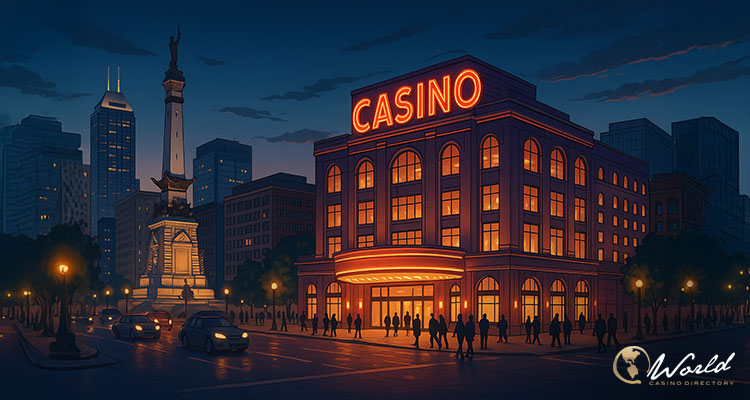A new state-mandated study has identified two regions in Indiana that could deliver the highest financial return if an existing casino license were moved: downtown Indianapolis and an area north of Fort Wayne near the intersection of State Road 8 and I-69. The analysis, released this week, follows a failed 2024 effort to relocate the Rising Star Casino to Allen County and was conducted by Spectrum Gaming Group at the direction of the Indiana Gaming Commission.
The research focused on finding areas with the greatest unmet demand for gaming. Spectrum Gaming Group ultimately highlighted four ZIP-code clusters statewide, with downtown Indianapolis and northeast Indiana topping the list due to their projected Annual Gaming Revenue (AGR) potential. According to the report cited by WANE 15, AGR served as the primary benchmark for evaluating each option’s financial viability.
Report Pinpoints High-Potential Zones
To assess new potential casino markets, Spectrum modeled “proxy points” rather than pinpointing exact casino sites. In Indianapolis, the proxy location was centered near the Indiana Statehouse—chosen for its proximity to major attractions such as the convention center and professional sports venues. The northeast Indiana marker was placed near Auburn, where SR-8 meets I-69, providing convenient access from Fort Wayne, the Indiana Toll Road, and Michigan markets.
Spectrum estimated that a downtown Indianapolis casino could generate roughly $493.3 million in adjusted gross receipts annually, resulting in $170.7 million in state tax revenue. That projection dwarfs current revenue from Indiana’s lowest-grossing casino—identified in the study as Rising Star Casino in southeast Indiana.
By comparison, the northeast Indiana location was forecast to produce $204.3 million in adjusted gross receipts and $61.1 million in tax revenue. The study emphasized the importance of accessibility and strong regional draw, noting both areas offer unique strategic advantages despite tribal casinos operating just over the Michigan border.
Implications for Existing Casinos and Industries
Indiana currently hosts 14 commercial casinos, with an additional 18 located nearby in neighboring states. Relocating a license rather than issuing a new one aligns with current state law, which caps riverboat licenses and encourages strategic optimization instead of expansion.
The study also weighed potential ripple effects on Indiana’s horse racing industry, especially if a casino were placed in Indianapolis. A downtown facility, the report warned, could redirect $140 million away from racetrack casinos—possibly cutting racing purses and incentives by $10–$17 million annually. A northeast relocation would have a much softer impact, with projected losses around $1.7 million.
Tourism effects were also considered, but analysts cautioned that a stand-alone casino—even in Indianapolis—would not create measurable statewide tourism gains unless paired with major attractions. As the report noted, “Unless a potentially relocated casino in Indiana were to include – or be proximate to – a regionally prominent convention center or other major attraction, it would not impact tourism beyond attracting gamblers from its core market catchment areas.”
Legislative Reaction and Community Concerns
State lawmakers are now tasked with considering whether a license should be moved—and if so, where. The study’s release generated mixed reactions among legislators.
Sen. Ryan Mishler questioned whether struggling casino operators should automatically gain opportunities to relocate. Meanwhile, Sen. Andy Zay welcomed the analysis, saying it highlights the growth potential of northeast Indiana.
However, Sen. Dr. Tyler Johnson strongly objected to the idea of bringing a casino near his district, asserting the financial focus overlooked social impacts. In his words, “The recent report released by the Indiana Gaming Commission ignores risks to families, schools and public safety — issues my constituents, colleagues and I demanded be studied. We needed an independent, comprehensive review of social, traffic, and infrastructure costs before any informed decision could possibly be made. Understanding things the way I do now, I oppose this attempt to relocate a casino to my community.”
The report also acknowledged a 45-acre parcel in northeast Indiana owned by the federally recognized Miami Tribe of Oklahoma. Although the tribe has previously stated it does not intend to use the land for gaming, its ownership factored into relocation considerations.


